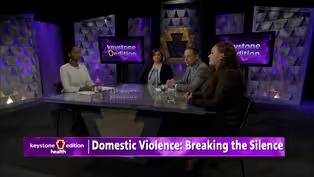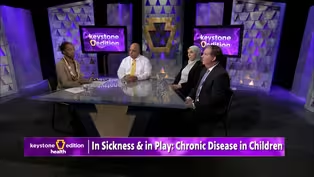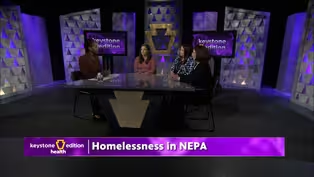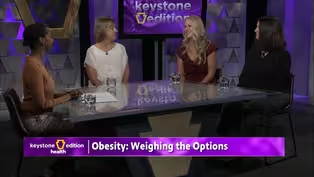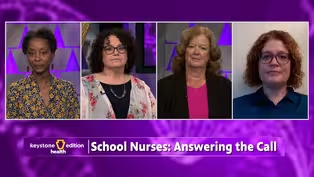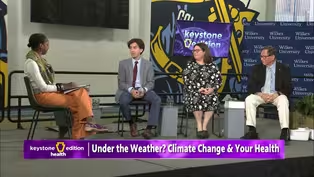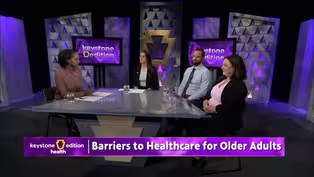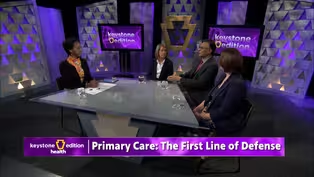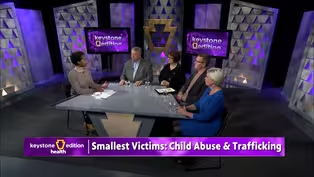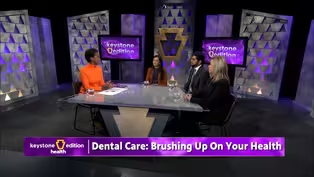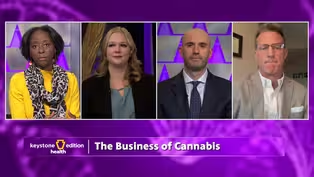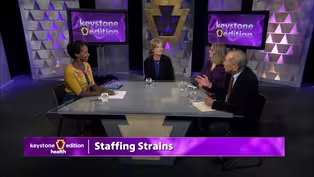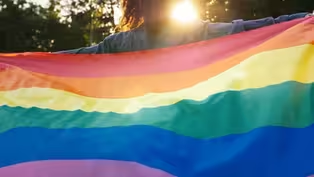Keystone Edition
Transgender Today
11/20/2023 | 26m 59sVideo has Closed Captions
As we raise the visibility on Transgender young adults and embrace them within our culture
As we raise the visibility on Transgender young adults and embrace them within our culture. Many people in the Transgender community are still having difficulty living their lives and finding acceptance in their communities. November is Transgender Awareness Month; this program will focus on educating people about the transgender community and the physical and mental health challenges they face.
Problems playing video? | Closed Captioning Feedback
Problems playing video? | Closed Captioning Feedback
Keystone Edition is a local public television program presented by WVIA
Keystone Edition
Transgender Today
11/20/2023 | 26m 59sVideo has Closed Captions
As we raise the visibility on Transgender young adults and embrace them within our culture. Many people in the Transgender community are still having difficulty living their lives and finding acceptance in their communities. November is Transgender Awareness Month; this program will focus on educating people about the transgender community and the physical and mental health challenges they face.
Problems playing video? | Closed Captioning Feedback
How to Watch Keystone Edition
Keystone Edition is available to stream on pbs.org and the free PBS App, available on iPhone, Apple TV, Android TV, Android smartphones, Amazon Fire TV, Amazon Fire Tablet, Roku, Samsung Smart TV, and Vizio.
Providing Support for PBS.org
Learn Moreabout PBS online sponsorshipMore from This Collection
Healthcare is constantly changing as technology finds new and better ways to help people live longer, healthier lives. Host Tonyehn Verkitus will address the issues that are important to the people in our community, including the ongoing pandemic, concerns about vaccines, food deserts, childhood trauma and child abuse, mental health, environmental issues, and the rising cost of staying healthy wit
Domestic Violence: Breaking the Silence
Video has Closed Captions
Access to the right resources can make facing this challenge a little easier for families (26m 59s)
In Sickness and in Play: Chronic Disease in Children
Video has Closed Captions
About 25% of children in the US aged 2 to 8 years have a chronic health condition (27m)
Video has Closed Captions
Homelessness can happen to anyone at any age or socio-economic status. (26m 59s)
Video has Closed Captions
Obesity is a serious risk factor many try to avoid when developing healthy eating habits. (27m)
School Nurses: Answering the Call
Video has Closed Captions
What can our school districts do to help retain and recruit nurses for future generations? (27m)
Under the Weather? Climate Change & Your Health
Video has Closed Captions
How does climate change impact individual and public health? (54m 59s)
Barriers to Healthcare of Older Adults
Video has Closed Captions
What progress have local organizations made in addressing these challenges? (27m)
Primary Care: The First Line of Defense
Video has Closed Captions
When was the last time you saw your primary care doctor? (27m)
The Smallest Victims: Child Abuse & Trafficking
Video has Closed Captions
What are the signs to know to spot child abuse and even possible trafficking? (27m)
Dental Care: Brushing Up on Your Health
Video has Closed Captions
How can providers make dental care more affordable and accessible? (26m 59s)
Video has Closed Captions
What does the cannabis industry mean for Northeastern and Central Pennsylvania? (26m 59s)
Video has Closed Captions
Low staffing levels can lead to burnout among healthcare workers (27m)
Providing Support for PBS.org
Learn Moreabout PBS online sponsorshipLive from your public media studios, WDIA presents studios, WDIA presents Keystone Addition Health, a Keystone Addition Health, a public affairs program that public affairs program that goes beyond the headlines goes beyond the headlines to address issues and to address issues and North-Eastern and Central North-Eastern and Central Pennsylvania.
This is Pennsylvania.
This is Keystone Addition, health Keystone Addition, health and now moderator Tanya and now moderator Tanya Verkitus.
Good evening, and Verkitus.
Good evening, and welcome to Keystone welcome to Keystone Addition Reports.
18 Addition Reports.
18 Verkitus.
Thank you for Verkitus.
Thank you for joining us tonight.
During joining us tonight.
During transgender awareness Week, transgender awareness Week, we honor and support those we honor and support those that have been brought down that have been brought down ridiculed and for some lost ridiculed and for some lost their lives.
Tonight, we'll their lives.
Tonight, we'll be delving into self be delving into self discovery for individuals discovery for individuals that are looking for that are looking for acceptance, along with many acceptance, along with many emotional, societal and emotional, societal and sometimes physical sometimes physical struggles.
They tackled struggles.
They tackled Dale.
We'll be talking to Dale.
We'll be talking to our panel of experts about our panel of experts about members of the Trans gender members of the Trans gender community and how we can community and how we can help be allies with.
But help be allies with.
But first, WDIA Tamraz has more transgender individuals transgender individuals often encountered difficult often encountered difficult deals with health care and deals with health care and face discrimination, which face discrimination, which can lead to issues with can lead to issues with mental health.
According to mental health.
According to the Movement Advancement the Movement Advancement Project, only three of Project, only three of Pennsylvania's 67 counties Pennsylvania's 67 counties and 70 cities have an and 70 cities have an ordinance that prohibits ordinance that prohibits discrimination based on discrimination based on gender identity.
and gender identity.
and private employment.
Housing private employment.
Housing and public accommodations.
and public accommodations.
Those protections cover Those protections cover about 35 percent of the about 35 percent of the state's population.
state's population.
Breaking down societal Breaking down societal stigma and advocating for stigma and advocating for policy changes are policy changes are essential steps toward essential steps toward creating a more equitable creating a more equitable health care landscape, health care landscape, highlighting these issues highlighting these issues and fostering a and fostering a compassionate, informed compassionate, informed community.
We can community.
We can contribute to the contribute to the well-being and resilience well-being and resilience of the transgender of the transgender population for Keystone population for Keystone decision health.
I'm Tom decision health.
I'm Tom Reese.
WRVA News Joining us tonight.
We had Joining us tonight.
We had just gotten Madonna, a just gotten Madonna, a licensed professional licensed professional counselor caring Goodwin, counselor caring Goodwin, executive director of executive director of Eastern P.A.
Trans Equity Eastern P.A.
Trans Equity Project, Lehigh Valley.
Project, Lehigh Valley.
Renison.
And joining us, Renison.
And joining us, Zoome or Rheem Gray, Zoome or Rheem Gray, executive director and executive director and founder of MEPA Shelter.
founder of MEPA Shelter.
Thank you all for joining Thank you all for joining us.
Thank you.
So I think us.
Thank you.
So I think it's probably very it's probably very important that we let our important that we let our audience know that today is audience know that today is actually transgender actually transgender remembrance.
Dave, remembrance.
Dave, remembrance.
Can you tell remembrance.
Can you tell us how this came about?
And us how this came about?
And also to understand why it's also to understand why it's so important?
Yeah, so so important?
Yeah, so transgender Day of transgender Day of Remembrance and Brazilian's Remembrance and Brazilian's So we often forget the So we often forget the second.
Are was founded in nineteen was founded in nineteen ninety nine in Boston to ninety nine in Boston to honor the death of a honor the death of a transgender woman named transgender woman named Rita Hester.
And since then Rita Hester.
And since then it's really expanded it's really expanded worldwide.
to create an worldwide.
to create an opportune city for trans opportune city for trans people and our allies to people and our allies to come together and to honor come together and to honor the people who have been the people who have been lost to transphobia and lost to transphobia and violence.
over the past violence.
over the past year.
and to really come year.
and to really come together as a community to together as a community to tell our stories and to tell our stories and to make sure that the the make sure that the the names of the people who names of the people who have been lost aren't have been lost aren't forgotten.
Just this past forgotten.
Just this past year, by our organization's year, by our organization's count, forty nine count, forty nine transgender people, United transgender people, United States of America have been States of America have been murdered based on their murdered based on their gender identity.
Another gender identity.
Another 120 plus have taken their 120 plus have taken their own lives.
And those are own lives.
And those are really just the ones that really just the ones that we know about, because we know about, because often people are mis often people are mis gendered in the press or gendered in the press or their stories aren't told their stories aren't told publicly.
And so this is publicly.
And so this is our opportunity to make our opportunity to make sure that they're sure that they're remembered.
Maureen.
Can remembered.
Maureen.
Can you tell us a little bit you tell us a little bit about why you started the.
about why you started the.
S shelter and maybe just a S shelter and maybe just a basic overview of something basic overview of something their programs were so the their programs were so the inspiration for the NBPA inspiration for the NBPA shelter was really from shelter was really from LGBT youth who approached LGBT youth who approached me during a previous job me during a previous job that I had and told me that that I had and told me that they would never tell their they would never tell their parents they were gay.
or parents they were gay.
or transgender because they transgender because they were kicked out of their were kicked out of their homes and there was no homes and there was no place to go.
And that place to go.
And that really stuck with me.
And really stuck with me.
And one reason why I started my one reason why I started my entire organization was entire organization was because I wanted to provide because I wanted to provide a safe place for LGBT youth a safe place for LGBT youth to find safety and security to find safety and security when and if their families when and if their families were rejected, though, at were rejected, though, at our center we have a our center we have a library, Heidi, of library, Heidi, of opportunities for not just opportunities for not just trans to kids, but other trans to kids, but other kids as well.
We have kids as well.
We have clothing rooms.
We have clothing rooms.
We have personal care products.
We personal care products.
We have meals and snacks and have meals and snacks and foods that they can take foods that they can take home.
We have games and home.
We have games and puzzles and a recording puzzles and a recording studio or an art room.
studio or an art room.
We've had some fabulous art We've had some fabulous art from some of our Transco.
from some of our Transco.
We identify as non binary We identify as non binary and Tranz that transport and Tranz that transport fluid fluid.
So that we fluid fluid.
So that we Welcome we include LGBT Welcome we include LGBT teens specifically in our teens specifically in our mission statement that we mission statement that we are welcoming and affirming are welcoming and affirming to teens.
And we're the to teens.
And we're the only nonprofit in the area only nonprofit in the area with flags.
The pride flags with flags.
The pride flags on our door.
Jessica, on our door.
Jessica, you're working with youth you're working with youth who may think believe who may think believe they're transgender.
I'm they're transgender.
I'm sure there's lots of issues sure there's lots of issues you have with parents, but you have with parents, but can we first just talk can we first just talk about how you address this about how you address this with the use that you're with the use that you're talking?
Yeah, sure.
So as talking?
Yeah, sure.
So as a therapist, it's my job to a therapist, it's my job to create a space where they create a space where they can come in and explore and can come in and explore and not feel judged and feel not feel judged and feel like they have a place to like they have a place to really have a conversation really have a conversation and flesh it out for and flesh it out for themselves, so to speak.
themselves, so to speak.
And sometimes it's really And sometimes it's really hard to do at home because hard to do at home because it's private and it's scary it's private and it's scary I don't know how it's gonna I don't know how it's gonna be received in with be received in with everything that goes on in everything that goes on in the news.
They're privy to he news.
They're privy to that just because they're that just because they're kids and teenagers doesn't kids and teenagers doesn't mean that they don't see it mean that they don't see it playing out in real time.
playing out in real time.
So it's a space for them to So it's a space for them to come and talk, offer and come and talk, offer and I'll do processing I'll do processing activities with them.
activities with them.
There's a great book by There's a great book by Darren Huffman.
Have you Darren Huffman.
Have you read this?
I think called read this?
I think called you and your gender you and your gender identity.
Darro was at the identity.
Darro was at the Trans Health Conference in Trans Health Conference in Scranton a couple years ago Scranton a couple years ago and it's all about looking and it's all about looking at it more, more at it more, more intricately and really intricately and really coming up with the coming up with the narrative and the story of narrative and the story of who they are and why they who they are and why they are that person so that are that person so that they have a stronger sense they have a stronger sense of their identity for of their identity for themselves, but also to themselves, but also to share that with other share that with other people caring.
You started people caring.
You started the equity project.
What the equity project.
What look at you said it stemmed look at you said it stemmed from being a support group from being a support group and wanting to do more.
Can and wanting to do more.
Can you speak to us about that you speak to us about that a little?
Yeah.
So we have a little?
Yeah.
So we have only transgender only transgender renaissance has been a renaissance has been a support group for support group for transgender people.
That's transgender people.
That's been meeting monthly since been meeting monthly since the late 1980s.
And I the late 1980s.
And I started attending that started attending that group back in the early group back in the early twenty tens.
I guess.
And twenty tens.
I guess.
And really myself and some really myself and some other folks who were other folks who were members of the you're members of the you're really decided that we really decided that we could do more.
And so in could do more.
And so in twenty nineteen we founded twenty nineteen we founded the Eastern P.A.
Trans the Eastern P.A.
Trans Equity Project.
We're an Equity Project.
We're an organization with a mission organization with a mission of empowering transgender of empowering transgender non binary people and the non binary people and the people who care about them people who care about them and with a focus on and with a focus on building community as well building community as well as advocating for social as advocating for social justice.
And we do that a justice.
And we do that a lot of different ways.
So lot of different ways.
So we actually you're just in we actually you're just in the process of launching the process of launching our ninth peer led support our ninth peer led support group.
So we have groups group.
So we have groups for trans masculine people for trans masculine people transform people, non transform people, non binary people, parum.
It's binary people, parum.
It's partners, neuro divergent partners, neuro divergent people, and and more.
But people, and and more.
But we also do a lot of work we also do a lot of work around advocacy and around advocacy and education.
So you just education.
So you just mentioned the the NEPA mentioned the the NEPA Trans Health Conference Trans Health Conference that we've spoken there and that we've spoken there and attended a number of attended a number of occasions just with our occasions just with our tables.
But we also do work tables.
But we also do work in Harrisburg around in Harrisburg around legislation, working with legislation, working with local school boards.
But local school boards.
But our biggest budget line is our biggest budget line is our basic needs programs.
our basic needs programs.
So we will provide So we will provide financial assistance and financial assistance and mentoring around legal name mentoring around legal name changes, housing assistance changes, housing assistance food assistance, help food assistance, help people pay for their people pay for their utilities and their utilities and their Internet service.
their Internet service.
their heating.
Because you can't heating.
Because you can't study and go to school, you study and go to school, you can't go to work and be can't go to work and be productive if you don't productive if you don't have a roof over your head have a roof over your head and food in your belly and and food in your belly and electricity to charge your electricity to charge your laptop.
Mooradian You have laptop.
Mooradian You have rapid response program rapid response program that's somewhat similar.
that's somewhat similar.
Tell us about the program Tell us about the program and how long it's been in and how long it's been in place.
Yes, yes.
So we have place.
Yes, yes.
So we have a rapid rehousing program a rapid rehousing program for homeless teenagers for homeless teenagers where we are very similar where we are very similar to Rensburg in that we to Rensburg in that we provide financial support provide financial support for housing, utilities, for housing, utilities, brochure Rie's helping them get a Rie's helping them get a photo ID, getting them photo ID, getting them signed up for SNAP benefits signed up for SNAP benefits or medical benefits.
or or medical benefits.
or anything else that they anything else that they might need.
And we will might need.
And we will provide that support provide that support generally for up to one generally for up to one year so that.
Yes.
Right.
year so that.
Yes.
Right.
Nothing like being home Nothing like being home with a teenager who has to with a teenager who has to do homework on a laptop and do homework on a laptop and you have no outlet.
You you have no outlet.
You have one uniform anhave have one uniform and have you watch that uniform, you watch that uniform, have you.
Right.
Have have you.
Right.
Have getting fed.
How do you getting fed.
How do you feed yourself?
It's a feed yourself?
It's a barbecue behind a school barbecue behind a school store.
So we provide that store.
So we provide that safety and secure already safety and secure already and as well as a mentor to and as well as a mentor to meet with them and talk to meet with them and talk to them about their issues, them about their issues, their problems, getting their problems, getting them resources that we may them resources that we may or we might not have other or we might not have other people might have.
We have people might have.
We have Welcome, LGBT teams in that Welcome, LGBT teams in that program.
In addition to program.
In addition to assistant or Tietz, you assistant or Tietz, you brought up identify brought up identify occasion and this came up occasion and this came up in both of our in both of our conversations.
So can you conversations.
So can you talk about what its talk about what its important?
Because it important?
Because it wasn't something I had wasn't something I had really thought about really thought about previous.
So over the last previous.
So over the last 18 months, we've helped 18 months, we've helped over 400 people complete over 400 people complete through legal name change through legal name change in court that includes in court that includes everything from all your everything from all your court documents, which is court documents, which is about 35 pages of legal about 35 pages of legal documents to mentoring them documents to mentoring them and helping people go and helping people go through the Procrit process through the Procrit process even financial assistance.
even financial assistance.
We do this across 26 We do this across 26 counties in the state.
And counties in the state.
And the thing to remember about the thing to remember about legal I.D.
is that so many legal I.D.
is that so many people take it for granted.
people take it for granted.
Right.
And they often look Right.
And they often look like, well, I have to show like, well, I have to show my I.D.
maybe when I go my I.D.
maybe when I go through security at the through security at the airport, or maybe I want to airport, or maybe I want to buy a bottle of wine at the buy a bottle of wine at the local grocery store.
But local grocery store.
But the truth is, is that you the truth is, is that you need to show your I.D.
when need to show your I.D.
when you go to the doctor, you you go to the doctor, you want to buy some, you know, want to buy some, you know, cold medicine from behind cold medicine from behind the counter.
You want to the counter.
You want to pick up a prescription and pick up a prescription and you get pulled over for a you get pulled over for a traffic stop.
And the fact traffic stop.
And the fact of the matter is, when your of the matter is, when your I.D.
doesn't match your I.D.
doesn't match your gender presentation and gender presentation and your gender identity, every your gender identity, every time you show that you're time you show that you're putting your life literally putting your life literally at risk, And today, with at risk, And today, with transgender Day of transgender Day of Remembrance, the proof is Remembrance, the proof is in putting so our goal in putting so our goal really is that we want to really is that we want to have these programs have a have these programs have a long tail if we can.
And so long tail if we can.
And so getting that legal getting that legal identifier Haitian is identifier Haitian is something that literally is something that literally is life changing because now life changing because now when you apply for a job, when you apply for a job, you don't have to out you don't have to out yourself, a transgender yourself, a transgender person when you're applying person when you're applying for that apartment.
you for that apartment.
you don't have to out yourself don't have to out yourself as a transgender person.
as a transgender person.
And as we heard in the And as we heard in the state of Pennsylvania, state of Pennsylvania, there is no statewide there is no statewide protection for LGBTQ people protection for LGBTQ people against housing against housing discrimination.
Recently, WGI is Sarasin to Recently, WGI is Sarasin to have the opportunity to sit have the opportunity to sit down with Rachel LDV, who down with Rachel LDV, who serves as the 17th serves as the 17th assistant secretary for assistant secretary for health.
Scuse me, for help health.
Scuse me, for help for the US Department of for the US Department of Health and Human Services.
Health and Human Services.
and discuss the and discuss the difficulties transgender difficulties transgender individuals face.
Dr Levine individuals face.
Dr Levine thank you so much for thank you so much for joining us tonight on joining us tonight on Keystone.
Health.
I'm very Keystone.
Health.
I'm very pleased to be here.
Thank pleased to be here.
Thank you.
How do you think that you.
How do you think that the transgender community the transgender community can find the support that can find the support that they need?
Now?
And how has they need?
Now?
And how has it changed?
Well, right now it changed?
Well, right now a pressing issue is a pressing issue is transgender medicine.
And transgender medicine.
And there's a lot of there's a lot of misinformation about misinformation about transgender medicine.
and transgender medicine.
and gender affirming care.
gender affirming care.
Gender fluid care is health Gender fluid care is health care.
It is based upon a care.
It is based upon a standard of care and standard of care and decades of study decades of study significant about amount of significant about amount of medical evidence.
And so we medical evidence.
And so we really need to be really need to be compassionate and affirming compassionate and affirming for young people.
Now, when for young people.
Now, when we talk about transgender we talk about transgender individuals, health, individuals, health, obviously the first thought obviously the first thought is gender affirming care, is gender affirming care, but there is so much more but there is so much more that goes into health care that goes into health care for any individual.
So what for any individual.
So what other disparities do we see other disparities do we see with the LGBTQ community with the LGBTQ community and the transgender and the transgender community?
as well?
Yeah, community?
as well?
Yeah, we see a lot of health we see a lot of health disparities for the LGBT, disparities for the LGBT, TQM, plus community, and a TQM, plus community, and a lot of that is due to the lot of that is due to the stigma and and it is stigma and and it is difficult in many places of difficult in many places of the country and in many the country and in many places of Pennsylvania for places of Pennsylvania for LGBTQ plus people, LGBTQ plus people, particularly Trench under particularly Trench under individuals, to to get to individuals, to to get to get their medical care.
get their medical care.
Your entirely right.
Your entirely right.
Transgender medicine is Transgender medicine is just one part of the just one part of the medical care, but they need medical care, but they need primary care, specialty primary care, specialty care, emergency care, like care, emergency care, like anyone else.
Thank you, Dr. anyone else.
Thank you, Dr. Levine, for joining us this Levine, for joining us this evening.
Thank you.
Speaking of gender Speaking of gender affirming.
Obviously, these affirming.
Obviously, these are conversations that are conversations that you're having with the you're having with the people that you see.
Is people that you see.
Is this a conversation you this a conversation you have with parents as well?
have with parents as well?
Because I'm sure the Because I'm sure the children are much easier.
children are much easier.
But then how do you help But then how do you help the parents?
Yeah, it's a the parents?
Yeah, it's a great question.
And it's great question.
And it's something that comes up something that comes up almost all of the time when almost all of the time when you're working with youth.
you're working with youth.
And you know something?
I And you know something?
I like to preface it with like to preface it with does I think that for the does I think that for the most part, it comes from a most part, it comes from a place of love and place of love and protectiveness.
There's a protectiveness.
There's a lot of misinformation and lot of misinformation and there's a lot of people there's a lot of people that are worried about how that are worried about how do I keep my kids safe?
do I keep my kids safe?
Because a lot of the Because a lot of the stories that you hear about stories that you hear about the transgender experience the transgender experience is dire.
Right.
It's the is dire.
Right.
It's the statistics are telling us statistics are telling us that this is a very unsafe that this is a very unsafe way to live your life and way to live your life and to go through life.
But my to go through life.
But my encouragement to the encouragement to the parents is always and this parents is always and this is not just in this topic, is not just in this topic, it's in general.
I think as it's in general.
I think as people we need to look for people we need to look for evidence of what we want to evidence of what we want to believe is true.
And so believe is true.
And so often people go looking for often people go looking for proof that this is going to proof that this is going to hurt their child or it's hurt their child or it's going to somehow inhibit going to somehow inhibit their ability to live when their ability to live when really what it does is it really what it does is it allows them to live.
It allows them to live.
It allows them to step into allows them to step into their truth.
That I always their truth.
That I always say to parents, you're not say to parents, you're not losing your child.
You're losing your child.
You're gaining *.
Just jump on that gaining *.
Just jump on that real quick.
So it's easy real quick.
So it's easy for us to look at for us to look at statistics right now.
And statistics right now.
And the statistics say that 57 the statistics say that 57 percent of transgender percent of transgender people are rejected by people are rejected by family.
That includes family.
That includes myself.
Right.
That 30 myself.
Right.
That 30 percent of us have been percent of us have been refused health care from refused health care from their doctor.
That twenty their doctor.
That twenty seven percent of us go to seven percent of us go to bed hungry at night.
that bed hungry at night.
that the poverty rate for the poverty rate for transgender people, transgender people, depending on if you were a depending on if you were a white person, it's 20 seven white person, it's 20 seven percent.
If you're a person percent.
If you're a person of color, it's upwards of of color, it's upwards of 40 percent.
But that also 40 percent.
But that also means that the other side means that the other side is true.
right.
That 60 is true.
right.
That 60 percent of us don't go to percent of us don't go to bed hungry at night.
Right.
bed hungry at night.
Right.
That seventy five percent That seventy five percent of us do not fall below the of us do not fall below the poverty line.
That forty poverty line.
That forty three percent of us have three percent of us have not been rejected by family not been rejected by family And it's very easy when you And it's very easy when you look at these statistics, look at these statistics, especially a parent that especially a parent that you think, oh, my gosh, my you think, oh, my gosh, my kid being trans is the end kid being trans is the end of the world.
Well, I will of the world.
Well, I will say that for myself, when I say that for myself, when I came out as a transgender came out as a transgender person, and lived my life person, and lived my life to the fullest.
It was the to the fullest.
It was the best thing that ever best thing that ever happened.
to me.
Right.
happened.
to me.
Right.
Because I could never gate Because I could never gate the world as the person I the world as the person I was meant to be.
Yeah.
And was meant to be.
Yeah.
And I'll say 100 percent a I'll say 100 percent a hundred percent of the hundred percent of the people that I've seen people that I've seen successfully begin their successfully begin their medical transition, their medical transition, their social transition, don't social transition, don't regret it at all.
That's regret it at all.
That's been my experience.
Well, been my experience.
Well, as you said, we often focus as you said, we often focus on the negative.
But we on the negative.
But we know there's been some wins know there's been some wins So what some of the So what some of the positive stories that we positive stories that we can share with people.
Yeah can share with people.
Yeah So one of the things I hear So one of the things I hear a lot recently is they talk a lot recently is they talk about and a transgender about and a transgender bills in the state bills in the state legislature.
And the truth legislature.
And the truth is, is that across the is, is that across the country, there's been five country, there's been five hundred and seventy years.
hundred and seventy years.
So bills introduced that So bills introduced that would harm the LGBTQ would harm the LGBTQ community.
What they're not community.
What they're not talking about is that we talking about is that we have defeated just shy of have defeated just shy of five hundred of them.
So five hundred of them.
So that's an 80 percent that's an 80 percent success rate.
And any success rate.
And any baseball player will tell baseball player will tell you if you have an 800 you if you have an 800 percent batting average, percent batting average, that you are the highest that you are the highest paid person on the planet.
paid person on the planet.
Right?
We are getting Right?
We are getting successes.
No, we need to successes.
No, we need to talk about the fact that in talk about the fact that in school board races recently school board races recently in this last cycle, that in in this last cycle, that in Pennsylvania we flipped a Pennsylvania we flipped a lot of these school boards lot of these school boards that were doing harm to that were doing harm to LGBTQ youth.
We need to LGBTQ youth.
We need to talk about it in the state talk about it in the state legislature.
There are 15 legislature.
There are 15 positive bills that would positive bills that would do everything from reform, do everything from reform, the name change process to the name change process to right.
The rights of right.
The rights of transgender people into transgender people into legislative law across the legislative law across the state.
And those are all state.
And those are all amazingly good things and amazingly good things and probably more than anything probably more than anything it's just that young people it's just that young people young queer people there young queer people there taken over the world.
Right taken over the world.
Right And, you know, they are And, you know, they are going to be doing a more going to be doing a more hazing things.
I see it hazing things.
I see it every day.
You know, the every day.
You know, the folks that you're working folks that you're working with who are just amazing young people and amazing young people and I'd love to see them grow.
I'd love to see them grow.
Yeah, I love this Yeah, I love this generation of kids.
that generation of kids.
that are coming up because they are coming up because they really recognize that they really recognize that they have to be active.
They have to be active.
They have to have they have to have to have they have to put their voice into the put their voice into the ring in order to create ring in order to create change.
And it's change.
And it's inspirational to me as inspirational to me as somebody who is a little somebody who is a little bit older to say like, yes, bit older to say like, yes, that's how you do it.
You that's how you do it.
You know, that's great changes.
know, that's great changes.
Is I seen Sergeant Majors a Is I seen Sergeant Majors a lot more support for our lot more support for our teens who identify on a teens who identify on a different identity.
There's different identity.
There's not the bullying or stigma not the bullying or stigma that was even five years that was even five years ago.
And so I think that's ago.
And so I think that's a real sign.
Progress in a real sign.
Progress in our society.
We have Martin our society.
We have Martin Rousso in the audience who Rousso in the audience who would like to share some of would like to share some of their stories for us.
their stories for us.
Martin, I'd especially like Martin, I'd especially like tor to ask you about your experiencin the 80s and experience in the 80s and what type of support system what type of supporsystem you had then and how you've you had then and how you've seen it change.
Well, I seeit chang Well, I srted my trsue missio start my transue mission n 1985 in n Diego, in 1985 , California,nd while 1 85 certnly wasn'the dark Ag by any sttch.
e dark Agesy any streh.
Thereas nothingThere There wasothing.
ere waso support.here wast to NLG, K, you cmunity.
So I was prett ommunity.
I was prett much mown.
Ands as much on mown.
And aas the yrs passed , likett theears passein, like the adve, t aent the Internet, came a ln came lot of infmation son about tra people son about tnseople 2010, Ioved to Scnton 20, I moved to rant from New rsey.
Scraon much smler area tha New Jsey, and Ieally wand get iolved with communitynd do so olunteer wk.
So I olunteeredor a quality volteered for qlity .A whichs where I me P.A., which is where I met more Ingrey and being out ore Ingrey andei out and open in Scranton s and open in Scranton has enably enabled me use my very unique skill set to help unique skill set to hp othereople understa the other people understand the tragender condition.
transgender condition.
People and, you know, it's People d, you know, it' it's been a phenomenal it's been a phenomenal experience for me that ins experience for me that in the first time my life he first time in my life I've er been able to be I've ever been able to be completely out and who I am completely out and who I am at my job There's no comparg to There's no mparing to that experience to to live that experience to to live your true self haveo get your tr self have to get to help people evy single to help people every single ay.
And my colleagues, my day.
And my colleagues, my client, I work in the clit, I work in the ealth care field, all know health care field, all know about me.
They emace it.
about me.
Ty embrace it.
as I embrace them.
And as I embrace them.
And things rely just have tngs really just have opened up considerably for opened up considerably for e. SI'm kind in the me.
So I'm kind in the Scranton area.
You go to Scranton area.
You go to trans guy for the things trans guy for t things that people need.
I spoken that people need.
I spoken at the Trans Health conference at the Medal school in Scranton.
Since sool in Scranton.
Since 2011, and for the past 10 2011, and for the past 10 years, I share my years, I share my experience.
It's called the experiee.
It's called the journey of Authenticity.
journ of Authenticity.
Transmen reflects on 39 Transmen reflects on 39 years.
I never would have yea.
I never would have expected there to be the expected there to be the openness and kindness and openness and kindness and acceptance that I've experienced in and around Scranton and the rest of Scranton and the rest of the country.
And I do trans the country.
d I do trans health conferences four, health conferences four, four, five times a year.
four, five times a year.
And I really look forward And I really look forward to them because I had no to them because I had no support.
I had no help.
And support.
I had no help.
And if I can provide that to a if I can provide that to a young kid early in his young kidarly in his transition, that that's transition, that that's reay all I need to feel really all I need to feel like.
I have earned mys like.
I have earned my place in the wod.
I'm wondering, this came up I'm wondering, this came up with you as well.
talking with you as well.
talking to medical students here, talki tmedical students to m, talking to medical students So does this mean that So does this mean that there is a transition in there is a transition in health care wherehere is health care where there is an interest?
Obviously, if an interest?
Obviously, if they've been deemed, there they've been deemed, there must be?
Well, I joy must be?
Well, I enjoy talking to the medical talking to the medical students because the students because e concept that 11 years ago concept that 11 years ago was this may be the only was this may be the only opportunity that medical opportunity that medical students have to hear about students have to hear about erenched and your patient entrenched and your patient And I'm hoping not.
But all And I'm hoping not.
But all along the medical people along the medical people I have experienced in my have experienced in my transition, I have educated transition, I have educated the doctors.
And as far as the doctors.
And as far as I felt is long as you ask I felis long as you ask me, respects fully, I will m respects fully, Iill tell you anything that you tell you anything that you need to know.
I think it's need to know.
I think it's important to acknowledge important to acknowledge that the average medical that the average medical student and this is student and this is somebody who's becoming a somebody who's becomi a doctor versus, let's say, a doctor versus, let's say, a nurse.
Right.
Gets about nurse.
Right.
Gets about four hours of training on four hours of training on LGBT health care.
And most LGBT health care.
And most of that is focused on HIV of that is focused on HIV prevention.
a treatment.
prevention.
and treatment.
So when you know whether So when you know whether it's Martin or myself, it's Martin or myself, we're able to go in for an we're able to go in for an hour and talk about health hour and talk about health care.
It can really make a care.
It can really make a huge difference in these huge difference in these people's perspective.
And people's perspective.
And to what Admiral Levine was to what Admiral Levine was saying earlier.
Transgender saying earlier.
Transgender ealth care, contraryo health care, contrary to what most people think, it what most people think, it isn't about transition care isn't about transition care It's about that you have a It's about that you have a broken arm and you need to broken arm and you need to go to the E.R..
It's about go to the E.R..
It's about that you have the flu or that you have the flu or kov it and you need to get kov it and yoneed to get treatment.
It could be that treatment.
It could be that y have cancer.
And so you have cancer.
And so what we don't want to have what we don't want to have happen is that transgender happen is that transgender people feel stigma ties people feel stigma ties when they're going into the when they're going into the doctor.
And, you know, I doctor.
And, you know, I know that I told you a know that I told you a story about a friend of story about a friend of mine who was having a heart mine who was having a heart attack.
And when they went attack.
And when they went into the E.R., they were into the E.R., they were outed as a transgender out as a transgender person to the entire staff.
person to the entire staff.
The sff said that they The staff said that they won't.
Since you're won't.
Since you're transgender, you probably transgender, you probably need to have mental health need to have mental health down here.
And they got up down here.
And they got up and walked out of the E.R.
and walked out of the E.R.
and we don't want to ever and we don't want to ever put anybody at risk.
You put anybody at risk.
You know, is a health care know, is a health care provider in any way, shape provider in any wayshape or form.
So the fact that, or form.
So the fact that, you know, Martin is able to you know, Martin is able to do it or I'm able to do it, do it or I'm able to do it, you know, we're able to you know, we're able to just maybe make health care just maybe make health re just that little bit more just that little bit more affirming for the next affirming for the next person that walks into that person that walks into that doctor's office.
Could I doctor's office.
Could I also, just as a person, I'm also, just as a person, I'm in the world of therapy, in the world of therapy, which falls under the which falls under the umbrella of health care.
I umbrella of health care.
I just want to also add that just want to also add that most professional most professional organizations have rules organizations have rules about being affirming, like about being affirming, like the American counseling the American counseling Association, even the Association, even the licensure board.
licensure board.
Pennsylvania has these Pennsylvania has these things in place that pretty things in place that pretty much stay like that.
You much stay like that.
You need to be affirming.
You need to be affirming.
You need to participate in need to participate in educating yourself.
So I educating yourself.
So I think that's imrtant for think that's important for people to know that it's people to know that it's alsmandated to us that we also mandated to us that we should be getting educated should be getting educated and and that, you know, if and and that, you know, if you are uncomfortable you are uncomfortable treating a person for treating a person for transitional care in transitional care in particular.
So no hormonal particular.
So no hormonal care or things like that, care or things like that, then you're obligated to then you're obligated to refer them to somebody who refer them to somebody who can.
Something I've been can.
Something I've been thinking about.
And I thinking about.
And I actually wanted to ask you, actually wanted to ask you, Maureen, and you might want Maureen, and you might want to touch on this as well.
to touch on this as well.
How are these children and How are these children and youths being treated in youths being treated in school?
Because we're school?
Because we're talking about health care talking about health care systems not wanting to care systems not wanting to care for these students.
What if for these students.
What if they go to the nurse or the they go to the nurse or the guidance counselor?
Well, I guidance counselor?
Well, I can only speak or, you know can only speak or, you know from the perspective of a from the perspective of a handful kids who told me handful kids who told me about their experiences, about their experiences, they are bullied a lot in they are bullied a lot in school.
and they do try to school.
and they do try to seek the security of a seek the security of a counselor's office.
But counselor's office.
But there are some people who there are some people who are very still are very still uncomfortable with the uncomfortable with the thought of a transgender thought of a transgender teenager.
And I don't know teenager.
And I don't know how react or respond I at my center, I allow I at my center, I allow them to take the clothes them to take the clothes that they want.
Illow that they want.
I allow them to use the bathroom.
them to use the bathroom.
They want I don't dictate any terms of thr transion or howhey want an only sa you know, again, te e gain, tellou from th storiesf some of e kids whoe come tme is that it's notf pce.
It shod be.
And they knowa they knowt shoulde at it's notf but is you know ut it's yokn, ndividual bies are difficu in the schoividl biasea difficu in the scol setti.
I would st add quick to thatutside of the schg the schl staff.ne thing that I tt I do seehanging the cultu with thei the ctureith their eersI see lot of tir eers.
I e a lot ofheir peershowing up for em peershowing ufor em nd being aies.
And I iortant.
also note, t'really iornt.
Tolso note, feel li we've bary fl ke we' barely cratched t surfa her and couldasily noer hr of conrsation.
But'd like onversation.
B I'd le to sathank you all of our guests for their insightnd to all of you foroining us for Keystone In additi, health tonhn In adtion, health tonyehn Verkis.
Have a good Verkitus.
Have a good evening.
Preview: 11/20/2023 | 30s | Watch Monday, November 20th at 7pm on WVIA TV (30s)
Providing Support for PBS.org
Learn Moreabout PBS online sponsorship
- News and Public Affairs

Top journalists deliver compelling original analysis of the hour's headlines.

- News and Public Affairs

FRONTLINE is investigative journalism that questions, explains and changes our world.












Support for PBS provided by:
Keystone Edition is a local public television program presented by WVIA
